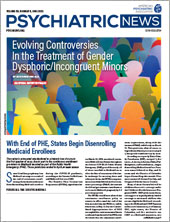The Dobbs v. Jackson Women’s Health Organization decision has sparked debate about the right to privacy regarding health care, violations of civil liberties, and compelling interest. What has received less attention, however, is the burden that the Dobbs decision imposes on the most vulnerable women in this country—women who have preexisting social, economic, medical, legal, and personal obstacles.
At the Anti-Human Trafficking Program at Baylor College of Medicine in Houston, we care for some of the most vulnerable and marginalized women in our communities. Many sex-trafficked women are initiated into trafficking through sexual violence and sold sometimes up to a dozen times a day. Women and children may be trafficked by their families or romantic partners. Trafficked women may lose autonomy over reproductive decision making, being forced into pregnancy or forced into pregnancy termination. Many of the women have serious mental illness.
Texas does not make an exception to allow abortion in cases of rape and incest, even when victims are very young children. Victims may experience reproductive coercion as a form of control and may not be able to travel out of state for abortions. In Texas, suicide and homicide account for 13% of pregnancy-related deaths. Inability to terminate a pregnancy keeps patients in contact with violent partners, putting women and their children at risk. In addition, leaving the state for an abortion may result in retaliation violence. Black women have a threefold higher pregnancy-associated homicide rate compared with White and Hispanic women.
Among nontrafficked women, social determinants, work commitments, and medical comorbidities restrict access to out-of-state abortion services. The Dobbs decision adversely impacts U.S. women in the military, women with chronic medical conditions who may be confined to their homes, and women who are homeless or financially impoverished and whose access to abortion decreases as abortion clinics are placed farther from their communities. Some women can’t travel out of state because they have no one to care for their children or other dependent family members. And of course, women who are detained or incarcerated have restricted freedom of movement.
Even in states where abortion is legal, women may be vulnerable due to their psychiatric conditions, with variable ability to consent and a vulnerability to exploitation and harm, especially if they suffer from a concurrent cognitive disturbance. In cognitively impaired women, a guardian may not consent to abortion or a potentially sterilizing procedure. In some circumstances, it may take weeks or months for patients to be stabilized and regain their mental capacity.
Many women seek medical abortions, which are also limited or banned by law in some states. Medical abortions may increase the risk of self-managed abortion through unsafe means. No state mandates health care professionals to report self-managed abortions, even in the case of minors.
Most psychiatrists are familiar with
The Turnaway Study, which found that compared with women who are denied an abortion, women who have the procedure are not more likely to experience depression, anxiety, or suicidal ideation; however, being denied an abortion results in worse financial, health, and family outcomes. “Turning away” women who are already marginalized is cruel and unethical and may cause moral distress to health care professionals. If a society is judged on how it treats its most vulnerable individuals, then we are failing miserably. ■

